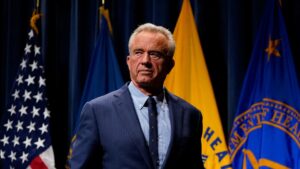The Future of Vaccination Guidance: Impacts of the HHS Shake-up
In a significant move that has stirred the healthcare community, U.S. Health and Human Services (HHS) Secretary Robert F. Kennedy, Jr. announced the dismissal of all 17 members of the Advisory Committee on Immunization Practices (ACIP). This committee plays a crucial role in shaping vaccination policy and strategies in the U.S., making the implications of this action profound and far-reaching.
Restoring Trust or Fueling Distrust?
Kennedy’s stated goal is to "re-establish public confidence" in vaccines. However, many health experts believe that this approach could backfire. Lawrence Gostin, a public health law professor at Georgetown University, voiced strong concerns, suggesting that this move politicizes science and breaks the trust in public health agencies further. He emphasized that undermining ACIP may reverse progress in U.S. immunization rates, potentially exposing the nation to risks from vaccine-preventable diseases.
Kennedy’s actions signal a potential shift in the recommendations that ACIP has historically provided, which are grounded in scientific research and public health data. This disruption raises concerns not only about vaccines but also about the integrity of health agencies tasked with protecting public welfare.
What’s at Stake?
The ACIP committee is pivotal in determining vaccination eligibility and the health policies that insurers cover. As Kennedy seeks to reshape this essential advisory body, one troubling possibility is the appointment of members who share his skepticism toward vaccines. This could shift focus from a balanced view of vaccine benefits to one that emphasizes risks, making vaccinations more voluntary and contributing to lower uptake among the public.
Experts warn that the consequences of lower vaccination rates can be dire, especially in light of recent outbreaks—and as the nation prepares for a busy summer travel season, the stakes are even higher.
The Geopolitical Landscape of Vaccine Policy
The implications of Kennedy’s restructuring extend beyond health policy; they also affect vaccine manufacturers like Moderna, Merck, and Pfizer. Analysts have expressed that the move could introduce uncertainty into regulatory processes crucial for vaccine approvals and recommendations. A significant risk to these companies is the fear that new ACIP members might adopt a more critical stance towards current vaccines, which would negatively influence public perception and market dynamics.
As we reflect on these developments, it becomes crucial for investors and stakeholders to remain vigilant. The challenges faced by vaccine manufacturers could influence their financial outlook, impacting stock performances and market viability.
An Open Dialogue on Vaccination
The recent actions taken by Kennedy do not appear to be aligned with promises made during his confirmation hearings, where he assured there wouldn’t be drastic changes to ACIP. As uncertainty looms about forthcoming appointments, active discourse among health professionals, policymakers, and communities is vital.
In light of the controversial decisions being made, the American Academy of Physician Associates has called for a transparent and diverse appointment process. These discussions are critical; they not only affect vaccine policy but also speak to the broader ethical framework that governs health in our society.
At Extreme Investor Network, we recognize the importance of accessible information in navigating these complex issues. As members of the investment community, finding clarity in healthcare trends is crucial for making informed decisions. We are committed to providing you with robust insights and analysis as this story unfolds.
Conclusion
The decision to dismantle the ACIP raises significant questions about the future of vaccination policies in the U.S. While Kennedy aims to restore confidence in vaccines, it’s essential for readers and healthcare advocates to scrutinize these changes. Public health is not merely a political issue; it’s a matter that affects us all. By staying informed and engaged, we can collectively advocate for policies that prioritize science, public health, and community wellbeing.
Stay tuned for more updates as we continue to monitor this evolving situation. Engage with us to share your thoughts, questions, and insights on social media and contribute to this critical conversation.

